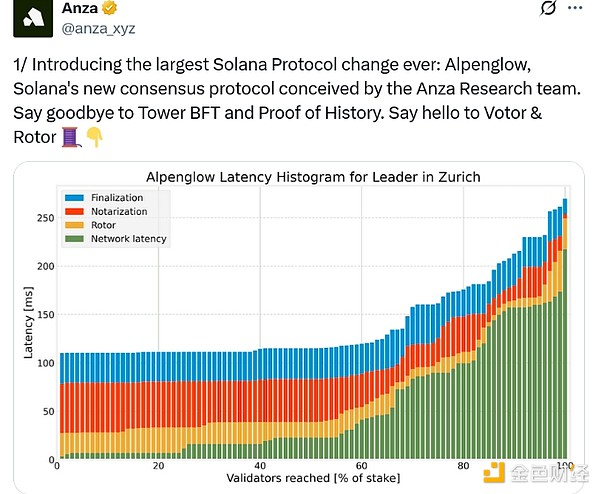Author: Brayden Lindrea, CoinTelegraph; Translator: Baishui, Golden Finance
Anza, the Solana blockchain infrastructure company spun off from Solana Labs, has proposed a new proof-of-stake (PoS) consensus mechanism called Alpenglow, claiming that it will be "the biggest change to the Solana core protocol" and will compete with existing Internet infrastructure.
"We believe that the launch of Alpenglow will be a turning point for Solana. Alpenglow is not only a new consensus protocol, but also the biggest change to the Solana core protocol to date," said Quentin Kniep, Kobi Sliwinski and Roger Wattenhofer of Anza on May 19.
Alpenglow consists of Votor (which handles voting transactions and block finalization logic) and Rotor (a data dissemination protocol). Votor will replace Solana's historical proof timestamp system and aims to shorten the time it takes for all nodes to reach a consensus on the state of the network.

Anza researchers claim that “Alpenglow will break both of these latency boundaries,” and the project expects its actual finality to be achieved within about 150 milliseconds, comparable to Internet infrastructure.
“A median latency of 150 [milliseconds] doesn’t just mean Solana is fast, it means Solana is comparable to Web2 infrastructure in terms of responsiveness, which has the potential to make blockchain technology suitable for entirely new classes of applications that require real-time performance.”
Votor (which will replace TowerBFT) aims to finalize a block in one round if 80% of the stake participates, or in two rounds if only 60% of the stake responds.
The two voting modes are integrated with each other and run simultaneously, with finalization occurring immediately once the faster of the two paths terminates.
Anza researchers claim this mode will result in “unprecedented finalization latency” while enabling it to operate more efficiently in “poor network conditions.”
Alpenglow Won’t Solve Solana’s Network Outages
The project’s whitepaper states that switching to Alpenglow won’t fully protect Solana from the network outages it has experienced in the past.
Solana currently has only one production-ready client, Agave, which means any security vulnerabilities in Agave could potentially take down the entire Solana network.
However, a new independent validator client called Firedancer will go live on Solana’s mainnet sometime this year, which will provide the network with a diverse set of clients.
 Coinlive
Coinlive 
 Coinlive
Coinlive  PANewslab
PANewslab Coinlive
Coinlive  cryptopotato
cryptopotato Beincrypto
Beincrypto Coinlive
Coinlive  Globenewswire
Globenewswire Bitcoinist
Bitcoinist Cointelegraph
Cointelegraph Cointelegraph
Cointelegraph